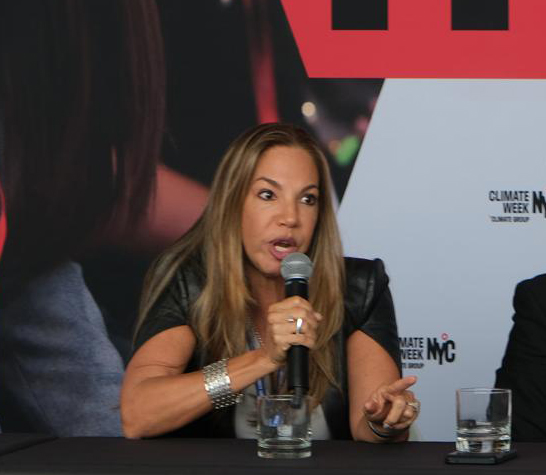By Carlos Roa, VoLo Foundation
Thais Lopez Vogel, co-founder and trustee of VoLo Foundation, kicked off a new phase at Climate Week NYC as the first spokesperson to officially speak in Spanish at this event.
Organized by Climate Group, this is the largest annual climate event of its kind. This year, it featured over 600 events and activities across New York City, including in-person, online and hybrid formats. The 2024 gathering was billed as the largest in history to address climate change.
Adam Lake, head of communications for North America at Climate Group, commented, “It was Thais and VoLo Foundation who inspired us to introduce sessions in Spanish to discuss the challenges confronted by Latino communities in the face of climate change.”
Lopez Vogel opened the Spanish-language media briefing titled “The Regional Impact of the Clean Energy Transition in the U.S.: Opportunities and Challenges,” organized by Climate Power En Acción. The session, moderated by Antonieta Cadiz, deputy executive director of Climate Power En Acción, brought together Latino climate leaders from nonprofit organizations, the private sector and government agencies.
Details of the first Latino meeting

In addition to Lopez Vogel, participants included Nathalie Flores, vice-chair of the United Nations Subsidiary Body for Scientific and Technological Advice (SBSTA) on Climate Change; Pablo Ribiero Dias, co-founder and chief technology officer, SOLARCYCLE; Monica Mata, senior manager, Latin America, Climate Group; Martin Levy, an associate at Covington & Burling LLP; and Alejandra Núñez, deputy administrator, Environmental Protection Agency.
Participants discussed the ripple effect of U.S. climate policies on Latin American countries and how U.S. Latinos are involved in the transition to clean energy production.
They all emphasized the importance of focusing climate policies on the populations most affected by climate change. They also highlighted the Biden-Harris administration’s efforts to ensure the benefits of the Clean Power Plan reach all people, especially the most vulnerable.
Additionally, they focused on the incentives and support private companies have received through the Clean Power Plan, including the creation of new jobs, to reach all communities, especially those historically marginalized.
While acknowledging the progress made in the transition to a clean energy economy since President Biden signed the Inflation Reduction Act, participants stressed the importance of the upcoming elections to protect the gains made and ensure the continuity of this transition.
The spokespersons and their contributions
“We need continuity to see the fruits of this law (the Inflation Reduction Act). It’s not a red or blue issue. It’s a green issue,” Thais Lopez Vogel said. “It affects all of us and we must be aware that sustainability is what we want for future generations.”
Martin Levy said, “With the Inflation Reduction Act and the Bipartisan Infrastructure Act, billions of dollars are already available in tax credits, in public loans, in competitive grants, which are impacting various industries.”
Alejandra Núñez said, “Most of the populations living near emission sources, polluting activities, power plants and high traffic roads are low-income communities, communities of color, Latino communities.”
Núñez also noted, “The president created the Justice40 initiative, and all agencies are required to consider these principles in the design of programs.”
More from Thais Lopez Vogel’s remarks
- “We cannot go backward because, just as fossil fuels helped us tremendously – we are here with lights and air conditioning because they fulfilled their purpose – but when one turns to science and realizes that they are causing more harm than good, change begins.”
- “What do we do now? We’ve come this far, and now we’re going toward renewables, right? That’s the future, that’s called progress.”
- “We all have something to gain. I, for example, have six children and I want to see them grow up in a better future than the one I had.”
- “We must understand health and education do not work in isolation, there is an intersection, and this intersection is climate change. Climate change affects not only health and education but also immigration and the economy, among other aspects. I believe we need to be very insistent on helping people understand and connect the dots.”
- “We’ve made significant progress, evidenced by our presence here today, speaking in Spanish at a long-standing event where previously no space existed for other languages or communities. Now, the Latino community is present.”
- “The Inflation Reduction Act is only two years old, with its durability being a positive aspect. Today we are working together, and we will continue this way for many years to come. The law still needs time for us to see its effects and the fruits of its impact.”
- “I believe it is crucial to continue to support the law, to support Latinos and other minority communities, and to help them understand the climate change issue.”
- “It’s also important that philanthropy – which is the area where I’m most active – invests much more in climate change solutions.”
- “Only 2% of global philanthropy goes to climate change, and this is what we need to change. We must demonstrate these investments offer a significant return. Not just an economic return, but also a health benefit. We breathe cleaner air, which is invaluable.”
Thais Lopez Vogel also moderated an English-language panel on the Inflation Reduction Act where she conversed with SOLARCYCLE Co-Founder Dr. Pablo Ribeiro Dias and Miguel Sossa, vice president of Capgemini.
Carlos Roa is senior press and PR director for VoLo Foundation. VoLo Foundation is a financial supporter of The Invading Sea. Banner photo: Thais Lopez Vogel speaks at Climate Week NYC. (Photo courtesy of VoLo Foundation). This piece was originally published at https://volofoundation.org/news/thais-lopez-vogel-inaugurated-the-latino-sessions-at-climate-week-new-york-city/.
Sign up for The Invading Sea newsletter by visiting here. If you are interested in submitting an opinion piece to The Invading Sea, email Editor Nathan Crabbe at ncrabbe@fau.edu.



